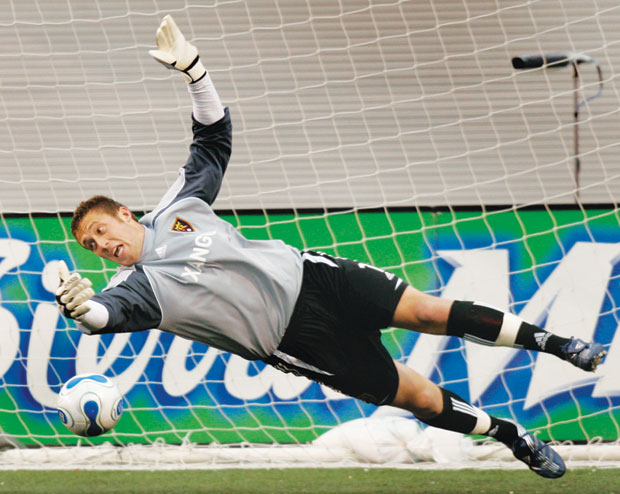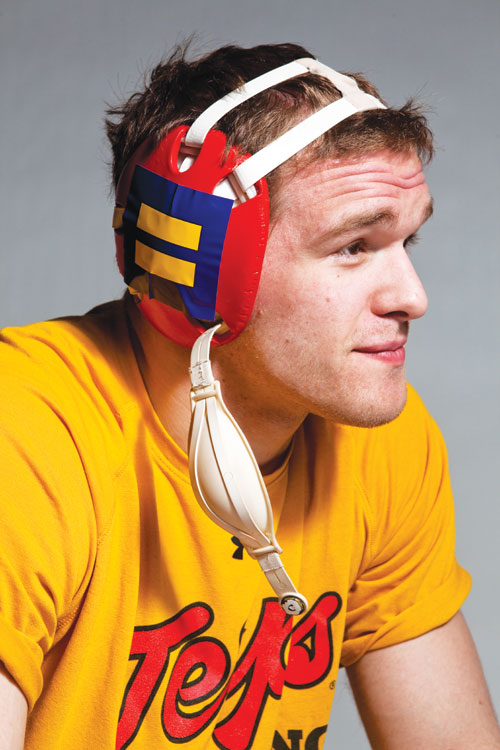Dallas Mavs owner Mark Cuban and FC Dallas goalkeeper Chris Seitz are paving the way for gays in sports through their work with Athlete Ally

HAVING A GOAL IN MIND | FC Dallas goalkeeper Chris Seitz calls Athlete Ally a support system and says his reason for joining was simple: ‘Letting people know if they come out, it will be fine.’ (Associated Press)
After professional basketball player Jason Collins came out this spring, Dallas Mavericks owner Mark Cuban called him a pioneer. That wasn’t surprising since Cuban’s been an LGBT ally for years.
But last week, Cuban took his support one step further by joining the advisory board of the national group
Athlete Ally, founded in 2011 by Hudson Taylor to make professional sports more accepting of gay players.
Cuban is the second North Texas sports figure to join Athlete Ally —after Chris Seitz, who plays soccer for FC Dallas.
“There was never a question in our family that everyone was treated with respect,” Cuban told Dallas Voice this week, explaining how he came to be gay-friendly.
“I’m not trying to change the world,” he said of joining Athlete Ally. “I’m simply trying to extend the expectation of acceptance to professional sports.”
He added that he isn’t worried about backlash from conservative fans in Texas.
“I don’t think the media portrayal of Texans matches the reality,” Cuban said. “My experience in North Texas has been one of acceptance.”
Asked whether he hoped to convince Mavericks players, such as future Hall-of-Famer Dirk Nowitzki, to join Athlete Ally, Cuban said: “I’m not out to convince anyone to join the board. I think there will be plenty of big names that find their own way to support AA.”
Indeed, there already have been.
Earlier this year, Baltimore Ravens linebacker Brendon Ayanbadejo joined Athlete Ally just before his Super Bowl appearance. Since then, Collins and Major League Soccer’s Robbie Rogers have both come out as gay, and lesbian star Brittney Griner from Baylor became the No. 1 overall draft pick in the WNBA.
Former Human Rights Campaign President Joe Solmonese and former New York Rangers hockey player Sean Avery are members of the Athlete Ally board. Tennis champ Martina Navratilova, sportscaster Brett
Haber and former NFL player Dave Kopay are advisory board ambassadors.
After Collins came out, Cuban said, “I would have no problem signing Jason if he fits our needs.”
He also made news with comments about Griner, who led her team to a 40-0 record and was Big 12 Player of the Year three times. She was the first NCAA basketball player to score 2,000 points and block 500 shots.
She is so good, in fact, there was talk of drafting her into the NBA.
“I’ve thought about it already,” Cuban said earlier this year. “Would I do it? Right now, I’d lean toward yes, just to see if she can do it. You never know unless you give somebody a chance.”
Since then, Griner began her professional career and debuted in May by setting a WNBA dunk record in her first game.
As an undergraduate, Griner was always out to her team and her friends. But her coach warned her about coming out in the press at Baylor, which is affiliated with the Southern Baptist church. The school reportedly was afraid it would hurt recruiting.

GOING TO THE MAT FOR EQUALITY
Athlete Ally founder Hudson Taylor, now a wrestling coach at Columbia University, started wearing an HRC sticker on his headgear as a senior at the University of Maryland. ‘Speaking out as an ally, I can save lives, change lives and change sports for everyone,’ he said.
Taylor said he founded Athlete Ally to combat just this type of discrimination. At the University of Maryland, he was a theater major and competed on the wrestling team. He said the contrast between complete
acceptance in the theater department and homophobia in the gym put things in perspective.
During his senior year, he decided to wear an HRC sticker on his headgear.
“Speaking out as an ally, I can save lives, change lives and change sports for everyone,” Taylor said this week.
He said athletes faced a chicken or egg problem.
“Athletes won’t come out until it’s safe for them to do so,” he said. “They need the support of the majority.”
Taylor, who now coaches at Columbia University, started wrestling at 6.
“It upsets me kids in this country that don’t have those opportunities because of their sexual orientation,” he said. “It would be enormously powerful for a member of the Dallas Cowboys to join.”
He said there’s no place for discrimination in athletics and he’d like to see more active players like FC Dallas’ Seitz join the organization.
Seitz’s college roommate was Robbie Rogers, who recently became the first openly gay player in pro soccer.
Seitz, who also attended Maryland, joined Athlete Ally earlier this year along with several other classmates. He said his reason for joining was simple.
“Letting people know if they come out, it will be fine,” Seitz told Dallas Voice. “We want people to be who they are.”
He said Rogers is in a much better place than he was before he came out. Seitz called Athlete Ally a support system.
“Letting people know it’s OK — that’s the coolest part about it,” he said.
Like Cuban, Seitz said he grew up in a family that encouraged him to be who he is.
“It’s not a big deal,” he said.
And he hopes that attitude becomes prevalent. He said an athlete coming out now makes headlines, but in the long run, he hopes it’s not news.
For Seitz, helping goes beyond aiding LGBT athletes. When he played in Salt Lake City, a teammate’s wife was diagnosed with a rare form of leukemia. They held a bone marrow drive and Seitz was tested. Last year, he was called because he was a match for someone he hasn’t met yet, and he took part of the season off to donate bone marrow.
“If I have the opportunity to save someone’s life,” he said, “I’d have a hard time dealing if I didn’t do it.”
And that’s how he views his affiliation with Athlete Ally — as an opportunity to help people.
This article appeared in the Dallas Voice print edition June 7, 2013.

